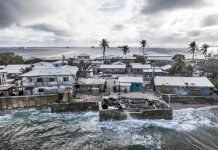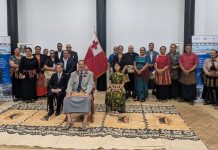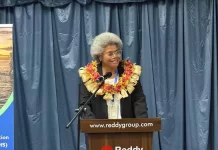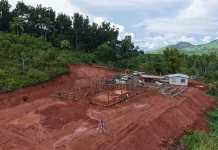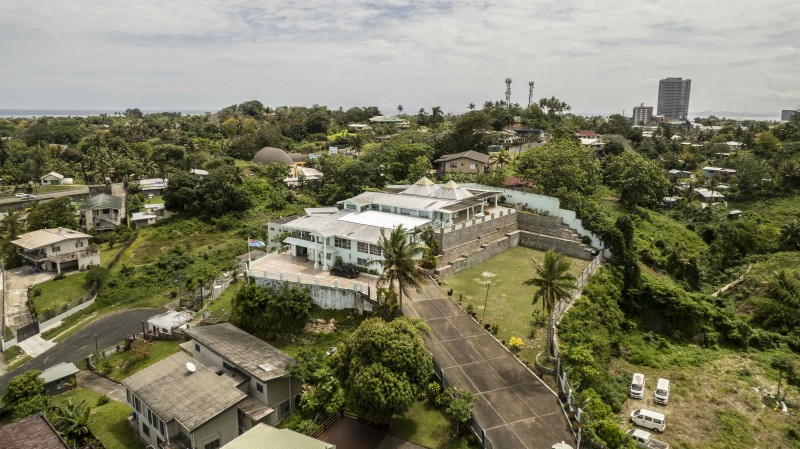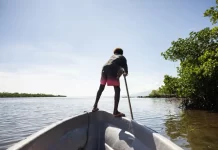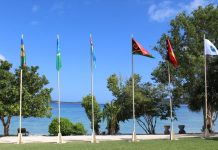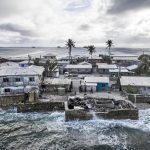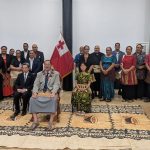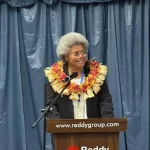The small Pacific Island country of Tuvalu purchased millions of dollars of property in Fiji from prominent Chinese Communist Party-allied businessman Zhao Fugang, just weeks after reporting by OCCRP and partners revealed that Australia had designated him as one of its top international criminal targets.
Tuvalu’s High Commission in Fiji agreed on 02 May to purchase three adjoining lots of land for FJD$5.8 million (US$2.7 million) in the Raiwai area of Fiji’s capital, Suva, from Zhao’s Yue Lai Hotel Company, according to a sale and purchase agreement obtained by OCCRP.
Drone images show the land plots contain a sprawling, light blue house in front of which a Tuvalu flag flies.
The sale agreement was signed by Zhao and Tuvalu’s high commissioner to Fiji, Eselealofa Apinelu, and stated that the money be sent in two tranches to a trust account run by Zhao’s Suva lawyer, Nikheel Nambiar. Land registry documents show that the ownership transfer was completed in late June.
The sale was signed just over a month after OCCRP and Australia’s Nine media outlets revealed that Australia’s top criminal intelligence agency had designated Zhao an Australian Priority Organisation Target (APOT). The APOT list is secret and contains the names of about a dozen people around the world deemed to pose “the most significant threats” to the country.
Zhao, who is a naturalised Fijian citizen, is a leading member of organisations based in Fiji that experts say work to promote China’s interests in the Pacific and build ties with local elites.
Documents first reported on in March by OCCRP and Nine show that Australian law enforcement believe Zhao holds another role: as the leader of an alleged transnational syndicate involved in drug smuggling, human trafficking, and money laundering.
Zhao has not been charged with a crime and denies any wrongdoing.
In a written statement, Tuvalu’s government told OCCRP that the property purchase was “to provide a suitable residence for the Tuvaluan High Commissioner close to other diplomatic staff and to use the property as an evacuation centre for Tuvaluans in Fiji, should the need arise.”
“Due to the size and the location of the property and land the purchase was assessed as a good investment opportunity for the Government of Tuvalu”, the statement said.
“The High Commission and Government of Tuvalu were not aware of the [Nine Media] 60 Minutes Australia programme or the OCCRP report when the property was purchased.”
Zhao’s lawyer, Nikheel Nambiar, said the sale was a “legitimate transaction” but declined to provide further details.
“Under Fijian Legislation there are no restrictions to buying and selling of properties provided that the local legislations of Fiji are complied with,” he said.
The purchase comes as low-lying Tuvalu, with a population of just 11,000, finds itself facing rising sea levels and a growing regional rivalry between China and the West.
Tuvalu and Australia signed a treaty last year that would allow the country’s climate-affected population to gradually resettle in Australia. In return, Canberra gained an effective veto on Tuvalu entering into security agreements with other countries, including China. China’s efforts to pursue security agreements with other Pacific nations – including a secret deal in Solomon Islands – have caused alarm in Western capitals.
The land deal represents a significant financial entanglement between Tuvalu’s government and Zhao. The value of the three Suva properties is equal to roughly four percent of Tuvalu’s annual GDP of US$62 million.


